My diary
Day 51 - 18 Jun 14
While we're waiting to collect our luggage in arrivals at Sentani, I realise I have left the headdresses on the planes, but as there's little in the way of security, no one stops me from running across the airfield and back onto the plane. Our hotel is situated really close to the airport, yet the taxis try to charge 50,000, so we walk instead. It only takes 5 minutes. We're staying at Hotel Rasen. It's clean and pleasant enough. We met a man called Ruddy in Wamena who offered to let us stay at his house for free, but we want to ensure he's a family man before we accept. We find his house with the help of two giggly teenage girls who are hanging out in the courtyard of the nearby church, but no-one's home. We eat chicken and rice with a nice tomatoey sambal from a local Warung in the evening.
Sentani itself is a small, dirty town, with nothing noteworthy to see. There's an overgrown football pitch, in the centre of which sits a memorial to the Papuan
Sentani - the festival and the lake
June 14, 2015
|
West Papua, Indonesia
Day 51 - 18 Jun 14
While we're waiting to collect our luggage in arrivals at Sentani, I realise I have left the headdresses on the planes, but as there's little in the way of security, no one stops me from running across the airfield and back onto the plane. Our hotel is situated really close to the airport, yet the taxis try to charge 50,000, so we walk instead. It only takes 5 minutes. We're staying at Hotel Rasen. It's clean and pleasant enough. We met a man called Ruddy in Wamena who offered to let us stay at his house for free, but we want to ensure he's a family man before we accept. We find his house with the help of two giggly teenage girls who are hanging out in the courtyard of the nearby church, but no-one's home. We eat chicken and rice with a nice tomatoey sambal from a local Warung in the evening.
Sentani itself is a small, dirty town, with nothing noteworthy to see. There's an overgrown football pitch, in the centre of which sits a memorial to the Papuan
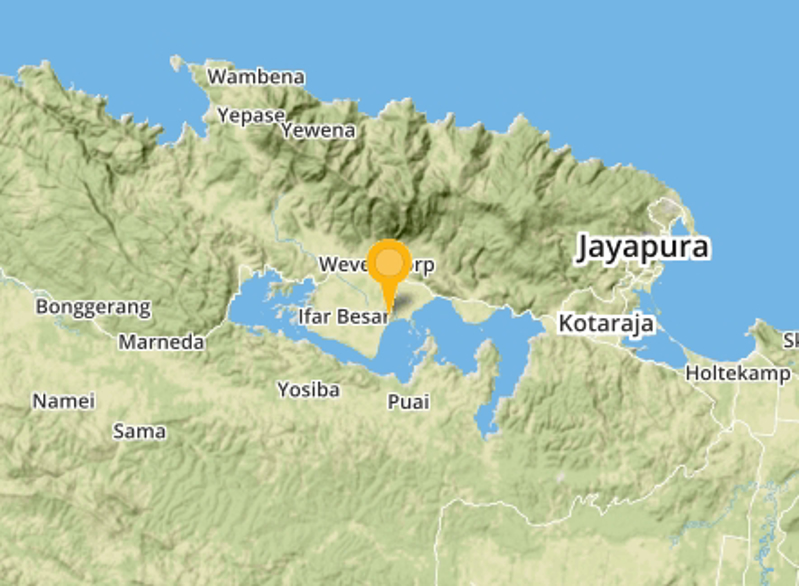
independence leader who was murdered by members of the Indonesian Army in 2001. By now we've read a little bit about the island's wish for independence. At present, raising the independence flag is punishable by a lifetime prison sentence. It is interesting that due to the Indonesian transmigration project back in the 70s the island's population is now only 50% Papuan, whereas prior to that it had been almost 100%. After such a long period, the damage done must be irreversible and I wonder what the effect of Papua gaining its independence would be now that it is also populated with 2nd generation Javanese and other Indonesians. Hannah found an article about a man called Benny Wenda who had been fighting for independence, and is currently seeking refuge from the Indonesian government in the UK. He grew up peacefully in a village in the mountains where they lived at one with nature. He was part of the Lani tribe where Wendy had also originated. He recounts the horrors from 1977 when the Indonesian government entered their villages and tried to change their way of life, torturing the people and raping the women in front of their children. We assume tensions must still be prevalent, especially after speaking to the American who had made it clear how unwelcome his Javanese colleagues felt in Wamena. When I had previously tried raising these questions to Wendy, he was not forth coming. I asked whether he liked the Indonesian government, to which he responded with 'yes' and offered no further opinion.
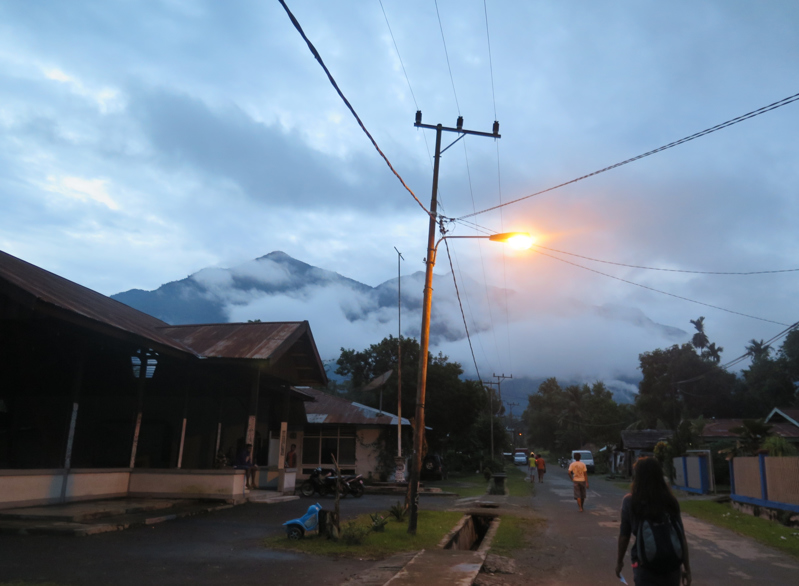
Day 52 - 19 Jun 14
We meet a guy at breakfast called Alex, who is originally from Bourneo, but now lives in New Zealand, and an American couple called John and Tamrika from Salt Lake City in Utah. We travel to the festival together. We've asked a few locals about the festival, but they have either been unaware that it is starting today or mildly unenthusiastic about it. One man tells us he enjoyed it the first time he went, but by the 2nd time it had become boring. We laugh as obviously we aren't planning to return next year. Alex can speak Indonesian which makes finding transport to the festival easy.
When we arrive, there is a stage where speeches are being held and a covered seating area. Everyone looks suitably bored. The sun is swelteringly hot. The setting itself is beautiful - the scenic lake is
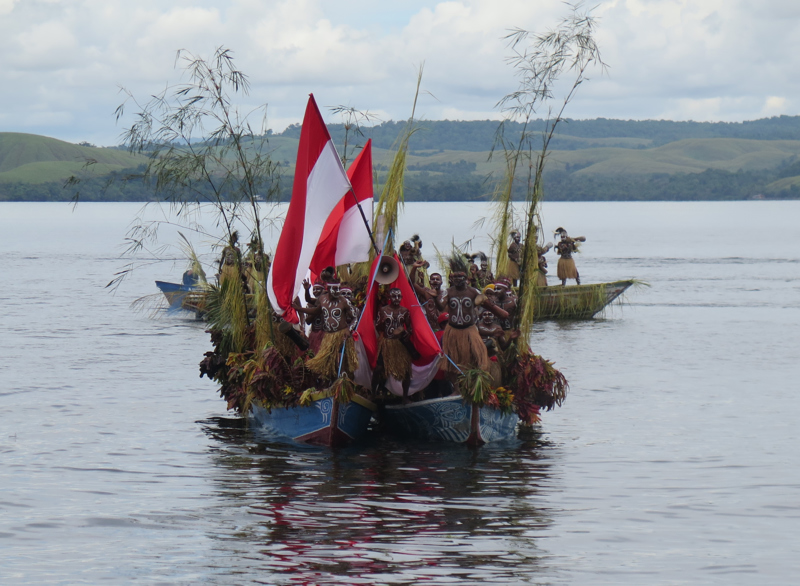
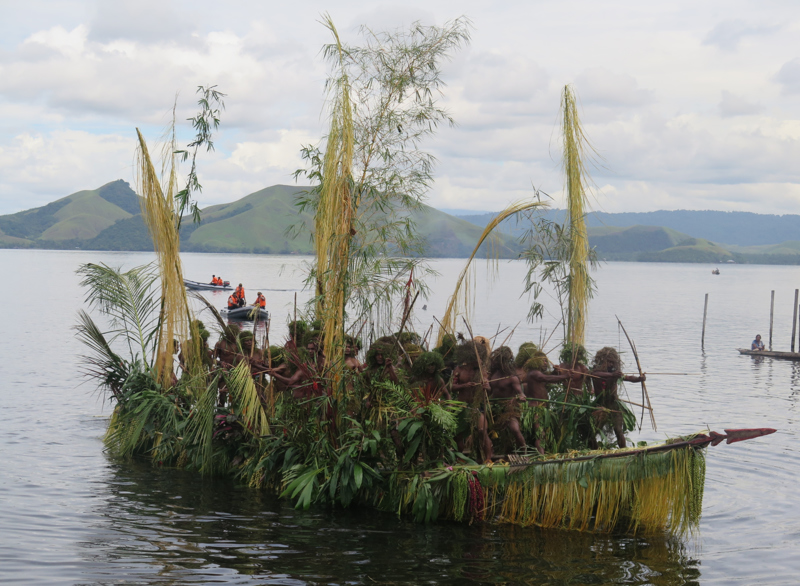
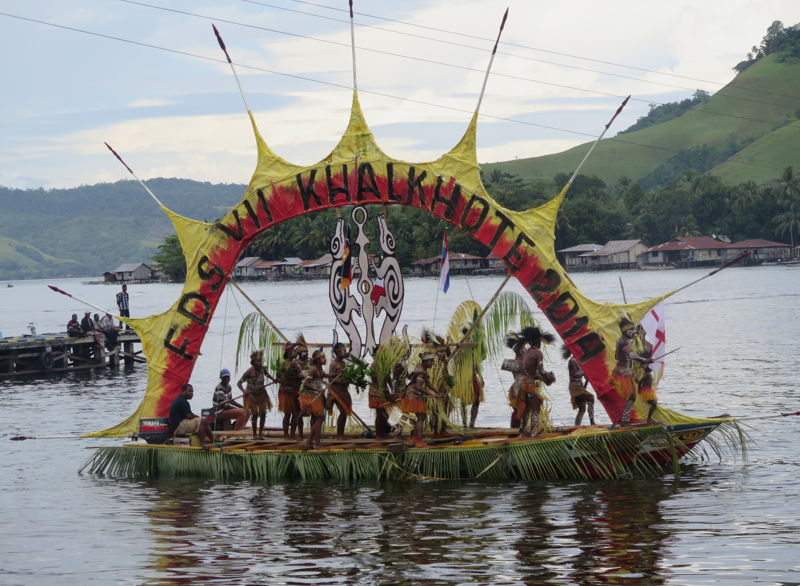
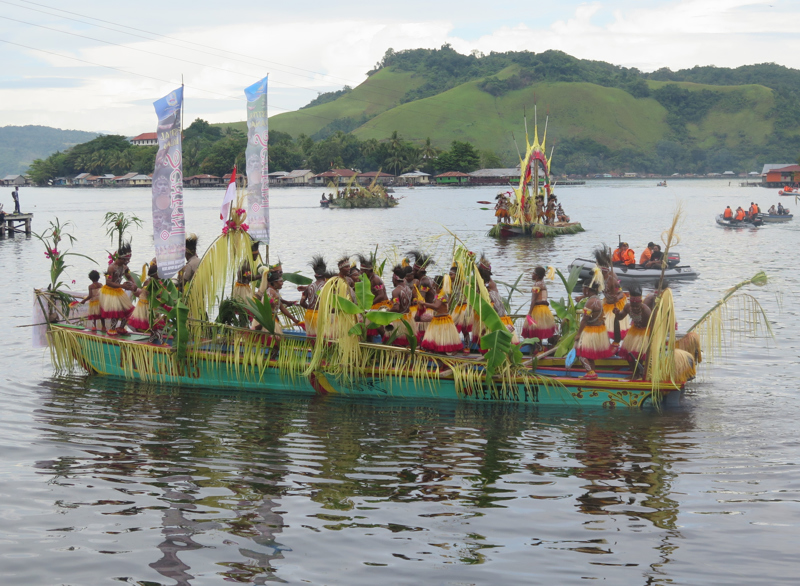
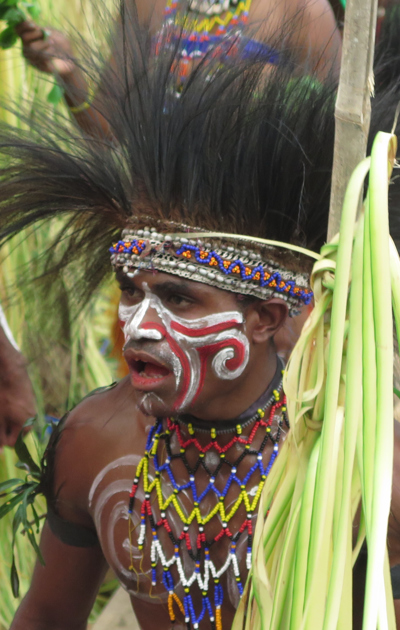
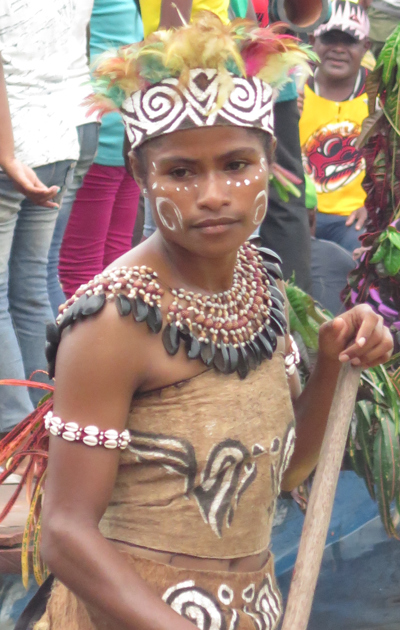
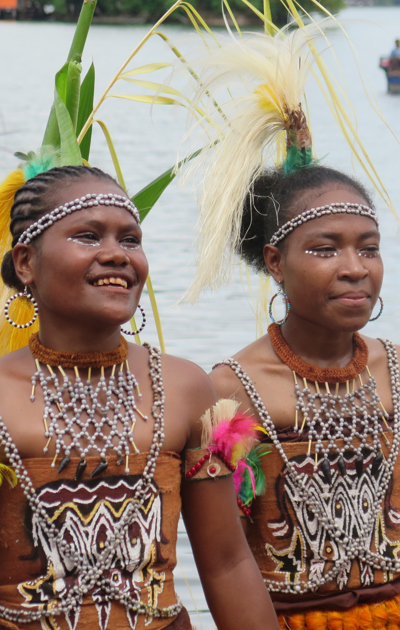
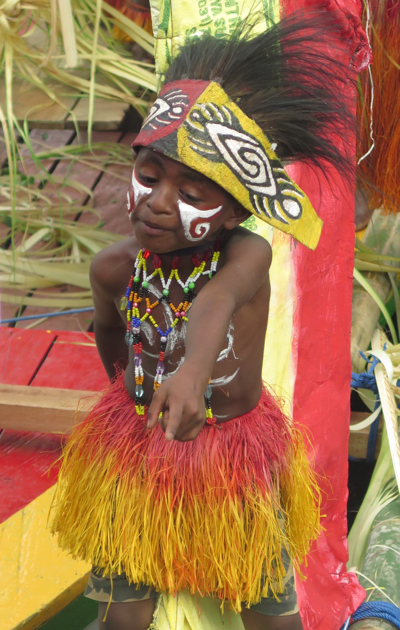
surrounded by vibrant green, soft-edged hills. We sit by the lake awaiting the entertainment. At midday, a tribal group dance energetically and sing in front of the stage. Midway through their set, we hear singing and drumming coming from the direction of the lake. Some of the audience who had previously been politely watching the spectacle, rudely walk through the centre of the dancing onto the stage, to watch the boats coming into shore.
There are different tribal groups, who have clearly spent time on their costumes and decorating their bodies in white and red paint, but it seems obvious that it is not their usual attire. They have each connected two boats together and created a platform balancing precariously, on which to dance. Some have decorated their boat with more enthusiasm than others. One has an arch like a spiky sun in yellow and orange. Another is covered in green foliage, which they are also wearing on their heads, as they brandish spears and arrows as if hiding amongst the undergrowth and then coming forth to attack. They sway backwards and forwards. Their smiley countenances suggest they’re enjoying themselves immensely: dancing, drumming, singing and jumping energetically. Each tribe tries to drown out the others, so that the sounds reaching the shore are a clash of differing rhythms and notes.
I am accosted by a lady who works for an Indonesian
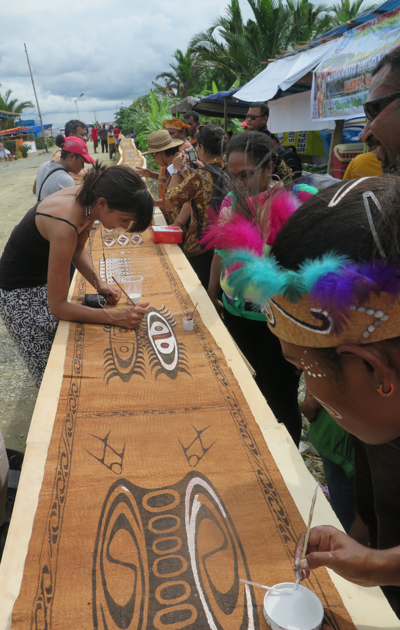
television company. She asks if she can interview me and I hesitantly agree. They stand me with my back facing the lake and ask me 3 simple questions. Whether I like the festival, if I would come to Papua again and what is my favourite thing about the festival. Since I have found the festival only mildly entertaining and the reality is that I am unlikely to return to Papua, I make something up and wonder how many interviews really relay honest opinions. The festival seems slightly controversial – we get the impression it has been put on by the Indonesian government to show they are embracing the tribal cultures of West Papua, rather than subduing them – a form of propaganda. The television company films us while we paint tribal patterns on bark laid out on long tables, with the white paint and twigs provided for people to try the local art form. Sweat is pouring down my face in the heat. After posing for photos, we leave the festival.
Ruddy has been in touch and he appears at the hotel to meet us. We are still unsure about staying with him so we decide to go to his house for a cup of tea to assess the legitimacy of his hospitality. The car that transports us turns right down the main road, in the opposite direction from his house. We have already told him that we visited the festival in the morning but it appears that he may have just understood the word 'festival' and assumed we wanted to go. Hannah shows him her photos from earlier in the morning, by which point we are already at the entrance. At first he looks confused, but then the reality dawns on him. To allow him to save face, we join him at the festival for a 2nd time. He shakes hands with his acquaintances and seems to be showing off his companionship with us the Westerners. He continuously offers to buy us snacks which we politely decline. He pays for us to go on a short boat ride on the lake around the small island nearby. We pass the wooden houses built on stilts on the lake, some houses almost subsiding into the lakes, all decorated with
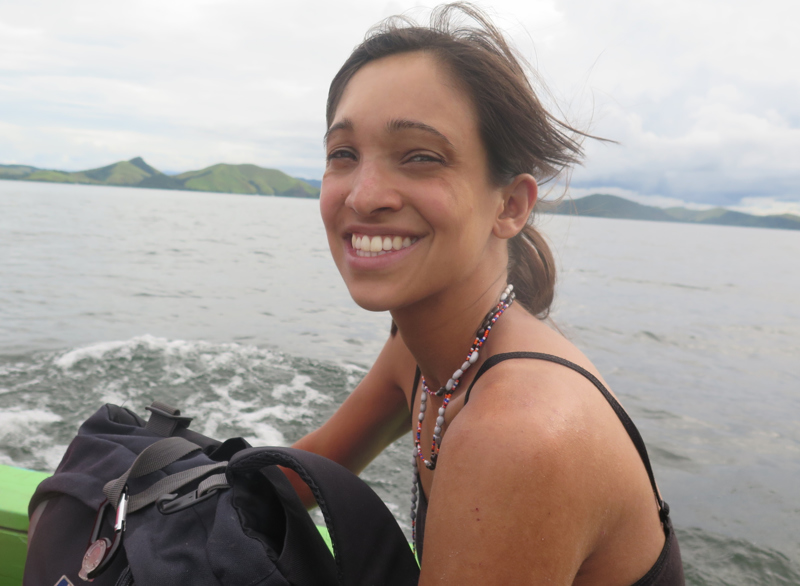
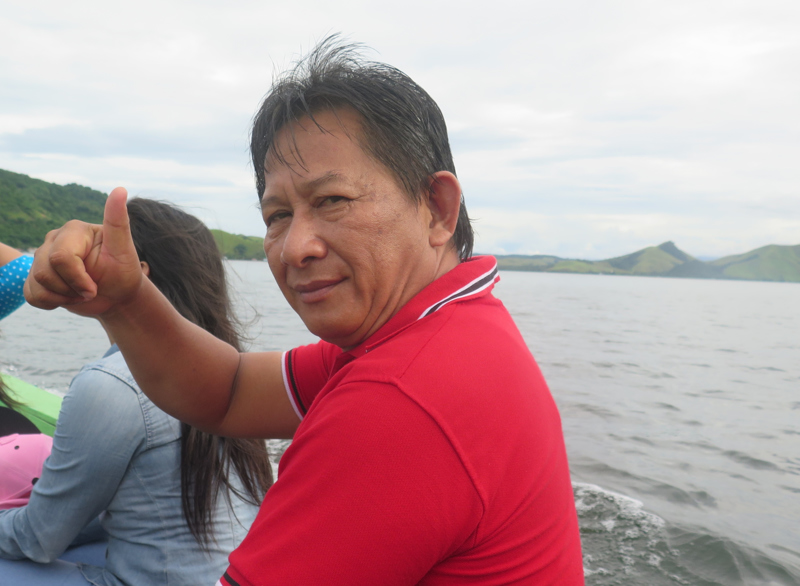
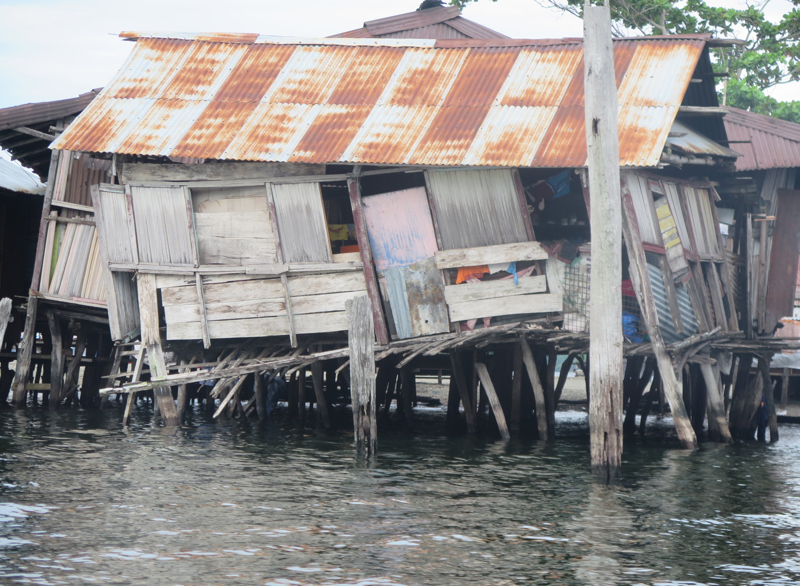
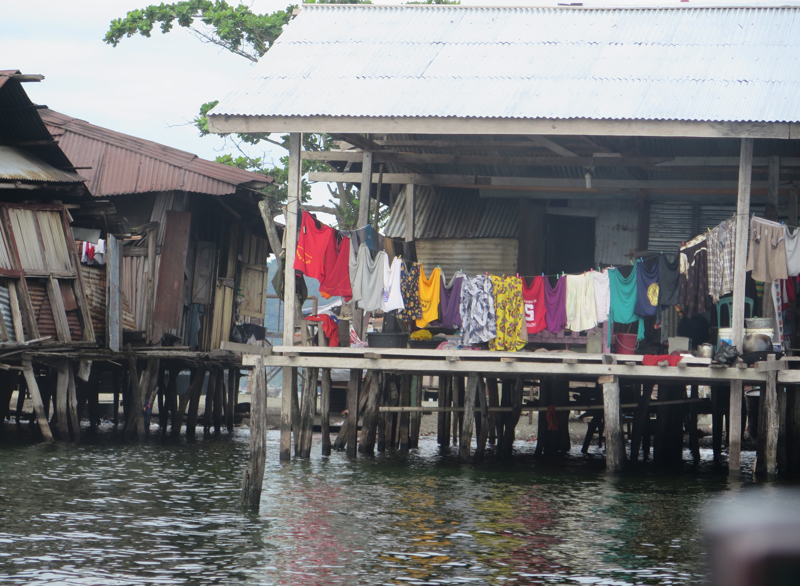
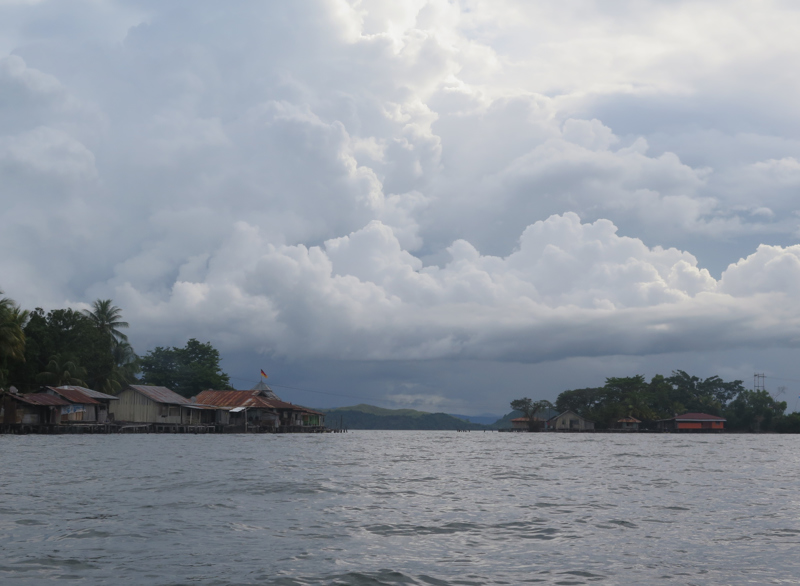
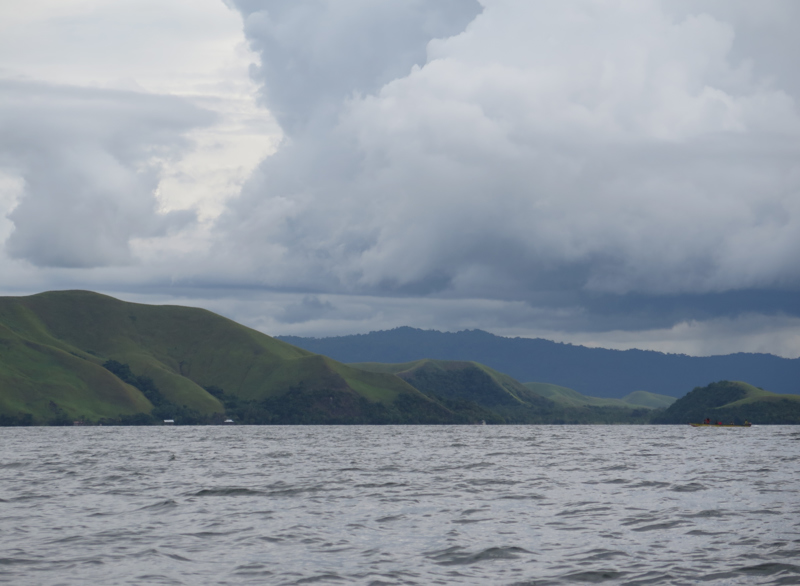
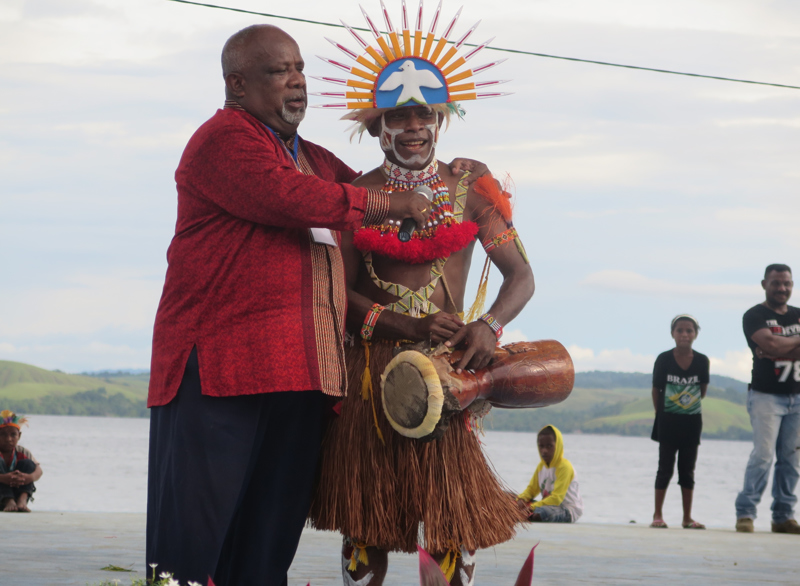
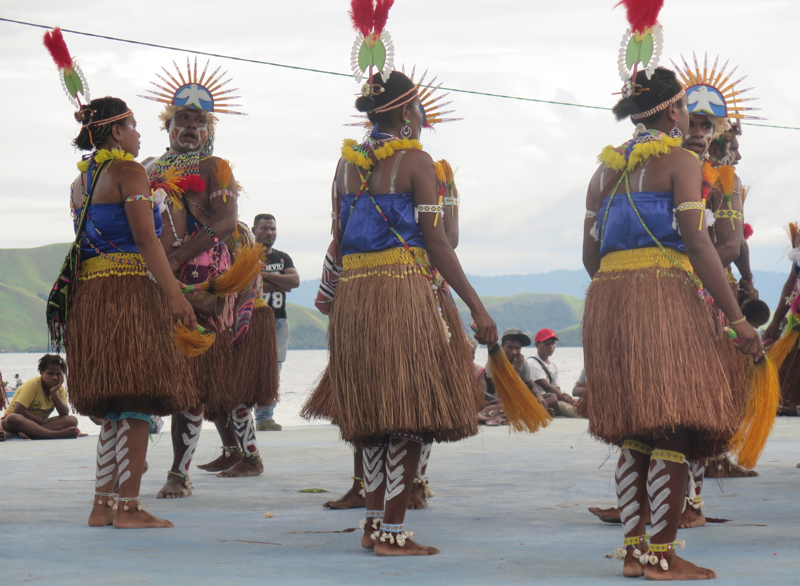
drying clothes. On our return to the festival, we watch choreographed dancing on stage – more entertaining than that which we had seen earlier. By now we feel it would not be rude to return to the hotel. We decide to stay in the hotel instead of his house, as we've already arranged to meet the others for dinner and since his grasp of the English language is lacking, it is an effort to converse with him.
In the evening, we head to a restaurant recommended in the guide book, which overlooks the lake. Alex is organised, and almost militant when deciding what we should all order at the restaurant. He's a really sweet guy and very knowledgeable. We like him a lot but can't help but be slightly amused by his unrelaxed attitude. He's travelling alone, but he will be joining his boyfriend in England for a relative's wedding.
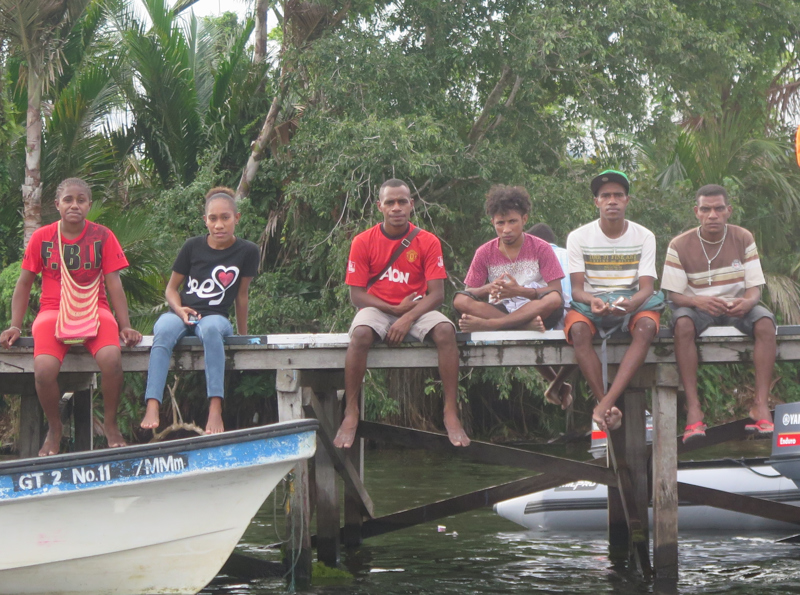
Day 53 - 20 Jun 14
In the morning we pack our bags and walk to the airport in the hope we may be able to find flights for the same day. This is futile as all flights are fully booked. Instead, we book flights to leave the following day. The cheapest flights to KL transit through Makassar in Sulawesi. There are still a few days remaining on our visa, so we decide to stopover in the hope we can see one of the infamous funerals. The rain is monsoon heavy so we are unwilling to walk back to the hotel and drench our backpacks, but the taxi drivers refuse to lower their price, despite the short distance. We wait stubbornly for the rain to stop, sitting on our bags on the tiled floor. Taxi drivers approach every now and then, hoping we will cave, which we eventually do as the sky is unlikely to clear.
Back at the hotel, the American couple are sitting on the balcony reading. They were planning to rent a bike to explore, but were prevented by the weather. John is tall and good looking, bearded with long hair. He oozes cool and confidence, lacking the hint of arrogance often accompanying this combination. He has a laid back attitude and a friendly countenance. Tamrika is originally from Georgia but she moved to the states when she was 16. She's friendly, smiley and inspiring. They're easy company and share a great sense of humour. It's nice to feel so relaxed and entertained by 2 people after so short an acquaintance. They set up a diner in Salt Lake City together 15 years ago, which has been hugely successful. She had a daughter at the age of 18 from a previous relationship. She originally studied film and still makes shorts in her spare time, although recently she directed a feature film based in Georgia. She completed a PHD in linguistics, for which she lived in Azerbajan in an isolated village over the course of 4 years, learning and then documenting an indigenous language where no written form yet existed. The focus for her thesis was on the grammatical aspect of this language. She's recently accepted a job in Saudi Arabia to teach linguistics, as it pays so well, but the two of them have plans to sail around the world. I spend the morning chatting to her. She's a pleasure to converse with as she's both interesting and interested.
Han and I spend the afternoon drinking iced coffee, eating fries and a chocolate truffle cake in a cafe in town. I catch up on my journal writing while she reads. We join the American couple for dinner. They're upbeat and witty and much of the dinner is spent laughing. I order chicken. The waiter tries to ask me whether I want a leg or an arm by waving his limbs around. I imitate his movements in confusion, inadvertently enacting a chicken dance. Everyone else is in stitches watching this bizarre exchange.
Day 54 - 21 Jun 14
Hannah has been up all night unbeknownst to me who has slept through her whole ordeal. She is very sick and I'm worried it might be serious. We have a flight to catch at 3, but she is still vomiting at midday and it is clear that the idea of even making the short journey to the airport is unbearable. I suggest that we don't fly today and she gratefully agrees, so I head to the airport in case there's any chance of a refund, but with low expectations. I pretend I'm catching the plane, so I can enter the Lion Air office from the other side, rather than queuing up behind the glass. After much miming, a man who speaks good English is pulled into the office. The cancellation fee is 90% of the full fair, but after much discussion I discover it is possible to get a full refund with a doctor's note. He draws me a map with directions to the doctors which is not far from our hotel, but recommends that we go at 7pm when it will be quieter.
Three German guys have arrived in the hotel so I chat to them on the balcony in the afternoon. One of them studied psychology and worked as a psychiatrist for teenagers with drug addiction problems. He tells me some interesting stories from times when his job has been particularly stressful or emotionally upsetting. We discuss the benefits and downsides of psychiatry, including the labels that are placed on people, which he says that psychiatrists are now trying to disengage from to a certain extent. He's a big advocate of Freud, being the first person to treat patients through dialogue between them and the psychoanalyst and for associating past traumas with current mental disorders. We discuss the horrors of historical treatments of mental patients such as electroconvulsive therapy, restraint using chains, lobotomies etc...
Han's feeling a little better in the evening, so I drag her out of bed to the doctors. Surprisingly, the whole experience is relatively painless. Using google translate I have written down her symptoms in Indonesian, with reasons for requiring a doctors note. Patients are packed into the corridor, but somehow we are fast tracked. This special treatment must be because we are Westerners, but I want to get Hannah back in bed, so I ignore my initial qualms about the unfairness of the situation. I hand the doctor the piece of paper with scribbled Indonesian phrases which we hope say the following: ' We missed the plane. Refund. Doctor's note. Diarrhea. Sick.' Apparently it's comprehensible. He nods and smiles and writes a doctor's note. He also prescribes medicine which we don't require. Amazingly, we're not even required to pay a fee for his time! We sidle guiltily past the queue of Indonesians waiting on our way out.
I hang out with the German guys in the evening and share some of their beer before bed. Tam and John return from their day in Jayapura and they can't quite believe it when they notice my head visible above the balcony on entering the hotel. They joke that they passed a good school earlier that day to which I can send my kids to, since I clearly have no plan to leave Sentani. They head off to pack as they are catching a flight to Wamena in the morning.
Day 55 - 22 Jun 14
In the morning I return to the airport again for the 4th time. I'm becoming a bit of a regular and all the taxi drivers recognise me. Depressingly, it's starting to feel like Groundhog Day. I sneak back inside successfully, as the security guards only pretends to scrutinise my ticket. At the office, the same lady is present. The price of the flights online are more expensive than our original tickets, so I expect to at least have to pay the difference, but miraculously I am only charged a small administration fee. I walk out of the airport in a jubilant mood. I consider returning to the festival with the German guys, for something to do, but it starts to rain again so I read instead. Late afternoon we spend a couple of hours in the Internet cafe. Han is trying to complete on her flat, which involves trying to sign and scan papers using very slow technology. There are still questions unanswered and it's a complicated process as she's not in the country. The situation is especially stressful as she has still not recovered from her illness fully. We have dinner with the German guys in the hotel before bed. Hannah still can't stomach food but she manages to sit with us for a while. In the Baliem valley, they had trekked without a guide to remote villages higher in the mountain, meeting Dani people who seemed to have never seen white-skinned people before. We listen to their stories and chat before bed.
Day 56 - 23 Jun 14
I can't wait to leave Sentani, and it is with a feeling of relief that we
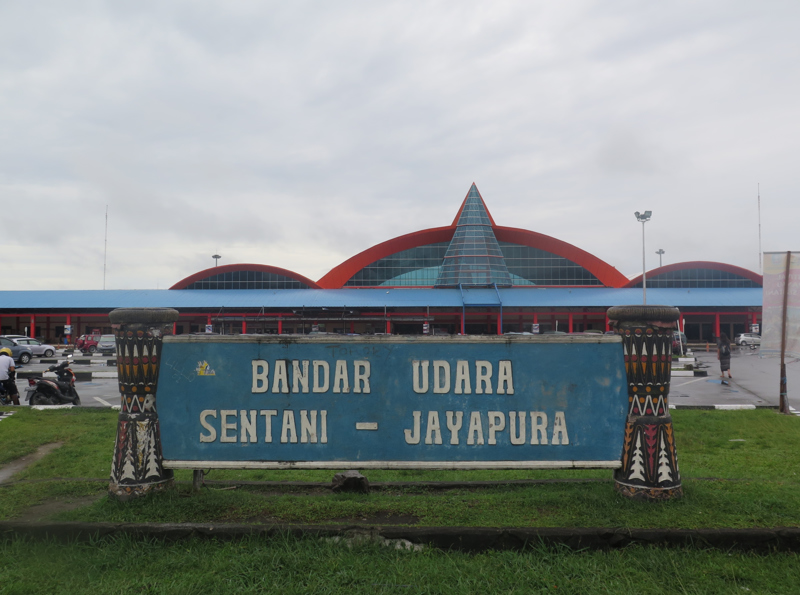

board the plane in the afternoon.
1.
Arrival in Jakarta, Pangandaran, Jogjakarta, Malang
2.
Volcanoes - Mt Semeru, Mt Bromo, Mt Ijen
3.
Ubud - a brief Sojourn
4.
Gilli Trawangan - white beaches and turquoise waters
5.
Boat Cruise - past the Komodo Dragons
6.
Flores - traditional villages and Mt Kelimutu
7.
Kuta, Lombok
8.
Baliem Valley - trekking in the mountains and meeting the Dani tribes
9.
Sentani - the festival and the lake
10.
Tana Toraja - Funerals and Burial Sites
11.
Kuala Lumpur - back in civilisation
12.
Cameron Highlands - trekking and tea plantations
13.
Georgetown, Penang - street art and crumbling mansions
14.
Banda Aceh and Pulau Weh - contending with Ramadan; Scuba Diving and snorkelling in paradise
15.
Lake Toba - the Batak people
16.
Bukit Lawang - Orangutans
17.
Unawatuna
18.
Volunteer Sri Lanka - Week 1
19.
Volunteer Sri Lanka Week 2
20.
Kandy and the East Coast
21.
Ella and Colombo
22.
Volunteer Sri Lanka - final week
23.
Earthbound Expedition - Kathmandu, Poon Hill and Chitwan National Park
24.
Back in Kathmandu
25.
Langtang - solo trekking
26.
Kathmandu to Varanasi
Share your travel adventures like this!
Create your own travel blog in one step
Share with friends and family to follow your journey
Easy set up, no technical knowledge needed and unlimited storage!